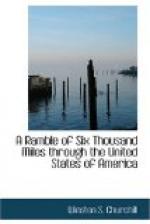When I was at New York about fifteen months before, I was informed that the working classes were being organized into regular bodies, similar to the “union of trades” in England, for the purpose of retaining all political power in their own hands. This organization has taken place at the suggestion of Frances Wright, of whom I shall again have occasion to speak presently, and has succeeded to an astonishing extent. There are three or four different bodies of the “workies,” as they call themselves familiarly, which vary somewhat from each other in their principles, and go different lengths in their attacks on the present institutions of society. There are those of them called “agrarians,” who contend that there should be a law passed to prohibit individuals holding beyond a certain quantity of ground; and that at given intervals of time there should be an equal division of property throughout the land. This is the most ultra, and least numerous class; the absurdity of whose doctrines must ultimately destroy them as a body. Various handbills and placards may be seen posted about the city, calling meetings of these unions. Some of those handbills are of a most extraordinary character indeed. I shall here insert a copy of one, which I took off a wall, and have now in my possession. It may serve to illustrate the character of those clubs.
THE CAUSE OF THE POOR.
The Mechanics and other working men of the city of New York, and of these such and such only as live by their own useful industry, who wish to retain all political power in their own hands;
WHO ARE IN FAVOUR OF AND WHO ARE OPPOSED TO
A just compensation for labour, Banks and Bankers,
Abolishing imprisonment for debt, Auctions and Auctioneers,
An efficient lien law, Monopolies and
A general system of education; Monopolists of
all descriptions,
including food, clothing
and instruction, equal for all, Brokers,
at the public expense, without
separation of children from
Lawyers, and
parents,
Rich
men for office, and to all
Exemption from sale by execution, those, either
rich or poor,
of mechanics’ tools and
who favour them,
implements sufficiently
extensive to enable them to Exemption
of Property from
carry on business:
Taxation:




